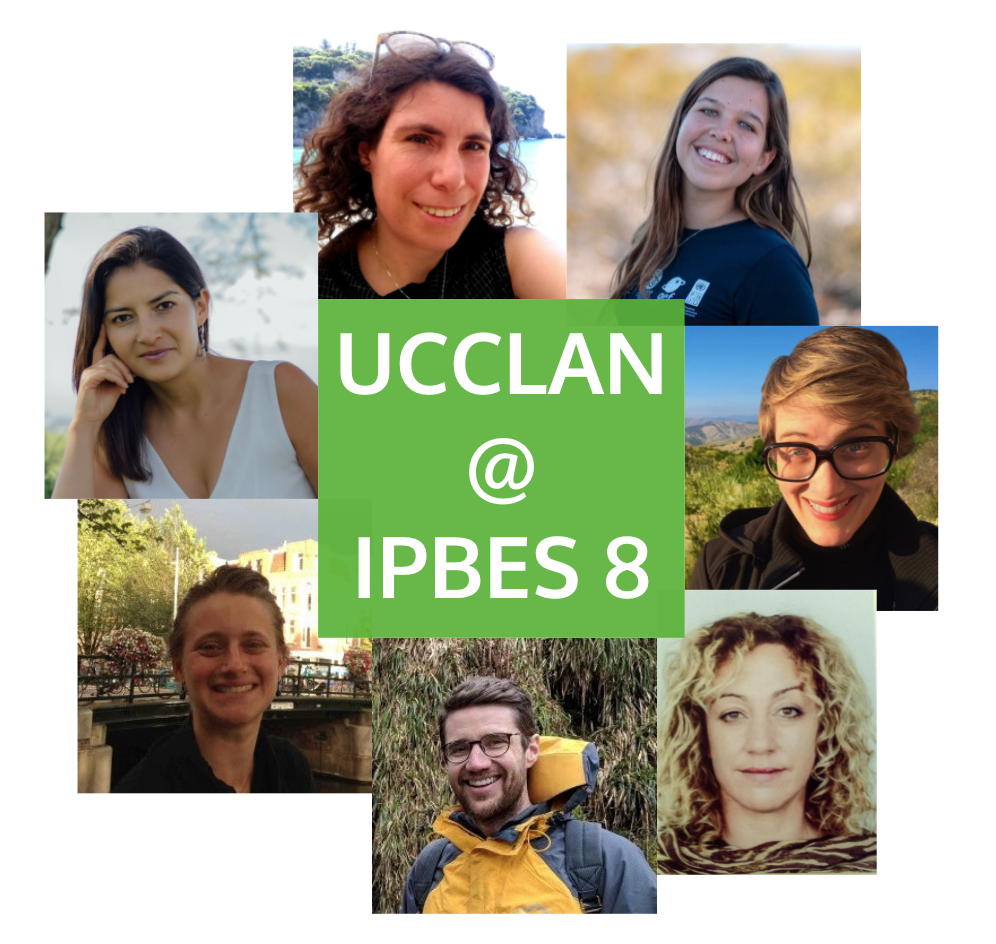
In Challenging Times, UCCLAN Members Team Up for Science and Policy
By Rosalind Helfand
In June, UCCLAN members teamed up to contribute to the 8th Plenary of the Intergovernmental Science-Policy Platform on Biodiversity and Ecosystem Services or “IPBES 8.” Despite the challenges of the virtual forum, it was an eye-opening experience regarding the dynamics among states and approaches to critical issues like biodiversity and climate change. Most importantly, we learned about our potential for working together.
Established in 2012, IPBES is governed by 137 member States and produces reports, like the 2019 Global Assessment of Biodiversity and Ecosystem Services, that inform policy makers, “strengthen the science-policy interface,” and are important for UN bodies like the Convention on Biological Diversity.
Alumni from seven cohorts participated in the 8th Plenary as observers. Our team included Iris Dicke (2013-14), Rosalind Helfand (2018-19), Alastair Jones (2017-18), Mariana Martinez del Rio (2020-21), Aylin McNamara (2014-15), Carolina Proaño-Castro (2015-16), and Noa Steiner (2016-17).
"It has been great to be part of the UCCLAN observers team. Even though participation can be a little bit of a rollercoaster, I have learned so much from the whole strategic and political process, and even more from other UCCLAN members. This has enriched my thinking and has been valuable in my work,” said Iris Dicke.
Aylin McNamara said, “Being a delegate to the IPBES talks has been an eye-opener to me and I am greatly appreciative of the opportunity as well as all the further insights, behind the scene discussions, and the supportive network developed by our UCCLAN group. I feel like we are helping each other become better at what we do. I really enjoy being part of such a caring and nurturing group.”
Other team members echoed the value of teaming up while noting that avenues for participation need to improve when people from around the world engage virtually. Carolina Proaño-Castro said that, “It was a pleasure meeting some really motivated and brilliant alumni from other cohorts.” But, she also felt that, “The IPBES process for stakeholder engagement was very complex and from my point of view not very inclusive. The digital format made it very difficult to interact with other stakeholders.”
Nevertheless, our team managed to collaborate and contribute from across time zones. Besides utilizing the online chat as a means for participating in the virtual discussions, we contributed written statements on how IPBES should assess these critical issues for its upcoming reports:
- Underlying causes of biodiversity loss and the determinants of transformative change and options for achieving the 2050 Vision for Biodiversity (transformative change assessment). Read our written statement.
- Interlinkages among biodiversity, climate, water, food, energy and health (nexus assessment). Read our written statement.
- Interlinkages between biodiversity and climate change and collaboration with the Intergovernmental Panel on Climate Change.
Our team also saw this as an opportunity to observe trends, attitudes, and dynamics in a critical global forum for biodiversity. This was especially meaningful as some members had just participated in the UN Convention on Biological Diversity’s (CBD) recent Subsidiary Body of Scientific and Technological Advice (SBSTTA) and Subsidiary Body on Implementation (SBI) discussions about the Post-2020 Global Biodiversity Framework that’s under development.
Noa Steiner said, "I thought it was interesting to see how CBD post-2020 SBSTTA discussions influenced the process of the IPBES assessment content decisions: it was mostly the same delegates as in CBD SBSTTA, who continued with the same narratives. I was unpleasantly surprised to see how some delegations tried to constrain scientific advice to existing status quo e.g current trade legislation."
Ultimately, we hope this is just the beginning for UCCLAN sending representatives to such global forums. Team members point to UCCLAN’s diversity -- of “perspectives, backgrounds, and experiences” -- and that we are professionals working in many biodiversity conservation fields. This means “we have a powerful and unique voice and vision to share.”
If, as another team member points out, we can be well-organised with a clear direction, the UCCLAN could position some transformational “ideas / concerns / solutions at the very high level.” And although these global forums can be daunting, and virtual settings an important challenge to overcome, we are “building UCCLAN’s capacity to work together as an international team.” In short, we can make a difference.
Rosalind Helfand (2018-19 cohort) is based in Los Angeles, California, where she founded PAJE Consulting for environmental and social policy issues. She is working with nonprofits and government at the local, state, and global levels on projects like engaging the state of California with the Convention on Biological Diversity. And she’s excited to be collaborating with fellow UCCLAN members to contribute to global discussions and action for the future of biodiversity.
